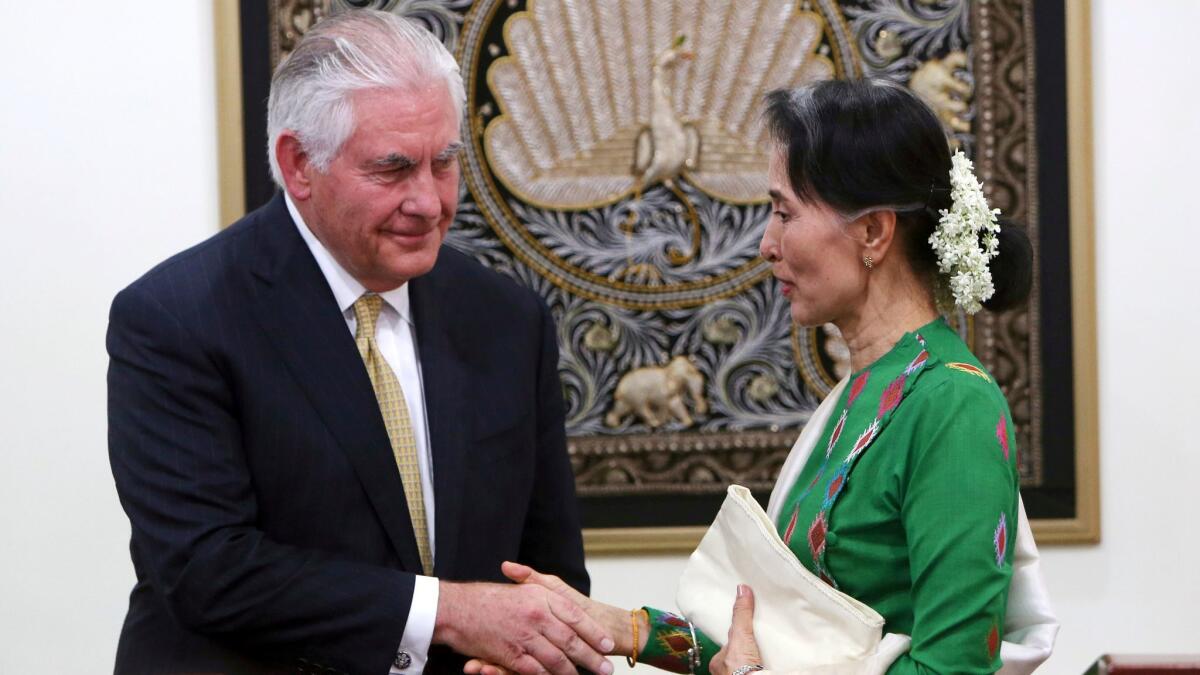U.S. would consider individual sanctions for Myanmar, official says

- Share via
Reporting from NAYPYIDAW, Myanmar — Secretary of State Rex Tillerson said Wednesday that the U.S. is deeply concerned by “credible reports” of atrocities committed by Myanmar’s security forces and called for an independent investigation into a humanitarian crisis in which hundreds of thousands of Muslim Rohingya have fled to Bangladesh.
Speaking at a joint news conference with leader Aung San Suu Kyi in Myanmar’s capital, Tillerson said the U.S. would consider individual sanctions against people found responsible for the violence, but he would not advise “broad-based economic sanctions” against the entire country.
“All of that has to be evidence-based,” Tillerson said. “If we have credible information that we believe to be very reliable that certain individuals were responsible for certain acts that we find unacceptable, then targeted sanctions on individuals very well may be appropriate.”
Tillerson’s one-day visit comes as a new report said there is “mounting evidence” of genocide against the Rohingya in Myanmar’s Rakhine state, where a government security operation has caused nearly 620,000 Rohingya to flee to neighboring Bangladesh.
Tillerson also met with Myanmar’s powerful military chief, Min Aung Hlaing, who is in charge of operations in Rakhine.
A senior U.S. State Department official said Tuesday that Tillerson would use the visit to “express concerns over the displacement and violence and insecurity affecting Rohingya populations and other local populations and discuss ways to help Burma stakeholders implement commitments aimed at ending the crisis and charting productive ways forward.”
Myanmar is also known as Burma.
Though Suu Kyi has been the de facto head of Myanmar’s civilian government since her party swept elections in 2015, she is limited in her control of the country by a constitution written under the military government that ruled Myanmar for decades. The military is in charge of the operations in northern Rakhine, and ending them is not up to Suu Kyi.
Still, Suu Kyi has faced widespread criticism for not speaking out in defense of the Rohingya. At Wednesday’s news conference, Suu Kyi denied she had been silent on the issue, saying she had personally commented on the situation as well as issued statements through her office.
“I haven’t been silent,” she said. “What people mean is what I say is not interesting enough. But what I say is not meant to be exciting. It’s meant to be accurate. And it’s aimed at creating more harmony and a better future for everybody. Not setting people against each other.”
But United Nations human rights chief Zeid Raad Hussein said he was “hugely disappointed” in Suu Kyi, noting that he had appealed to her after a smaller-scale flight of Rohingya in October “to use all her emotional standing and moral standing inside the country to confront the military and put an end to this.”
“Evidently, she was unable to do that and now she speaks in compassionate terms,” he said in response to a question after a lecture at Columbia University on Tuesday.
But Hussein said he fears the Rohingya who have fled to Bangladesh since Aug. 25 won’t be able to return “because the operations were so systematic, so organized, so well-planned, that there was intent involved.”
More to Read
Sign up for Essential California
The most important California stories and recommendations in your inbox every morning.
You may occasionally receive promotional content from the Los Angeles Times.












